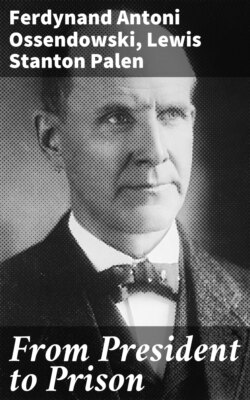Читать книгу From President to Prison - Ferdynand Antoni Ossendowski - Страница 3
На сайте Литреса книга снята с продажи.
Оглавление
COLLABORATOR'S NOTE
Table of Contents
AGAIN it has been my pleasure to assist Dr. Ossendowski in the textual preparation of a manuscript which contains material of unique appeal.
In this volume he gives an account of his personal experiences during the Russo-Japanese War and in the Revolution of 1905, as it affected the Far East, and offers what is probably the most intimate picture of the life of the Russian prisons in Siberia and Manchuria that has ever been drawn for the western world by one who has himself lived through the regime of these institutions.
By the medium of these experiences he presents a strong arraignment of the Tsar and his officials for the errors they committed in the handling of their own and their subject peoples, and admits us also to a most esoteric revelation of the psychology of prison life.
In his story we have likewise a fair epitome of the whole tragic history of that great body of Poles which has been forced to find its life under the dominating overlordship of the Tsars and which has constantly struggled toward the hope of a renewed existence of freedom. Though of no direct benefit to the movement in which he participated, his imprisonment produced unexpected results in another feature of Russian life. This was in the prisons themselves. For, as he indicates in the closing chapter of his text, he wrote a romance based upon his prison experiences, which contained such stirring material and was so strongly phrased that it at once brought down upon him the censure and renewed persecutions of the Russian Government. The volume was condemned and confiscated and proceedings were instituted to secure his return to those very walls of which he had written so dramatically.
When the first edition was burned, he had a second brought out under a slightly different title and a copy of this placed on the desk of each member of the Duma just as it went on sale. The result was that these representatives of the people were so stirred by his presentation of the life within the prisons that they took the matter up in the Duma and finally forced the Government's hand to institute reforms in their administration. The principal changes which resulted were the segregation of the prisoners in such a way that only the most hardened and vicious criminals were thrown together in the large common cells; the provision of reasonable work for the inmates; the establishment of libraries and occasional talks for the men; and the emphasizing to the officials of the necessity for seeking to ameliorate the moral state of mind of the condemned.
As it was a uniquely significant result of his efforts on behalf of those unfortunate ones whom he had left behind within what he so picturesquely calls the "stone sack," so must it have been a tribute of peculiar appeal to Dr. Ossendowski, when he received an immense address carrying the signatures of many thousands of criminal prisoners, expressing a profound appreciation of his work for them, as well as those of the two eminent writers, Leo Tolstoi and W. Korolenko.
Lewis Stanton Palen.
Le Bouveret, Switzerland,
June, 1925.
